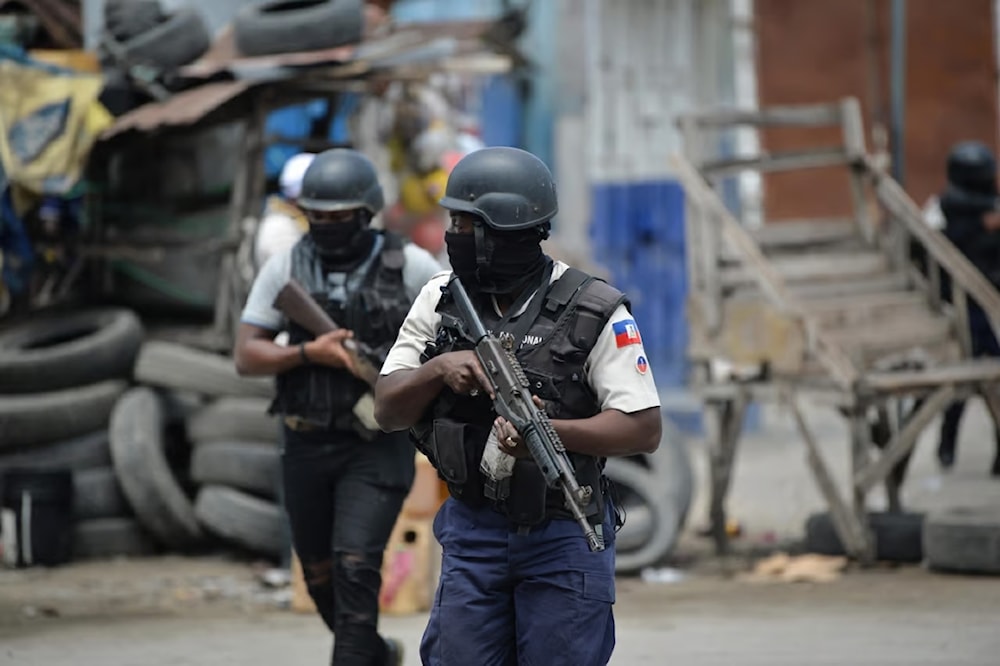Mission in disguise: US-founded, Kenya-led force touches down in Haiti
The UN-approved military and security force is expected to launch operations in the Caribean country by the end of May.
-

Haitian police officers patrol a neighborhood amid gang-related violence in downtown Port-au-Prince on April 25, 2023 (AFP)
Hundreds of foreign security and military forces are expected to land in Haiti soon as part of a US-established UN-approved mission to deploy soldiers and police members in the Caribbean country, The Washington Post reported on Friday.
The situation in Haiti plummeted starting late February as powerful and well-armed gangs took control of most of the capital Port-au-Prince and much of the country saying they aimed at toppling Haitian Prime Minister Ariel Henry - who resigned last month.
Kenya will lead the mission with the most personnel, supported by up to 2,500 police officers and troops from different nations to allegedly "stabilize" the security situation in the country. Forming the coalition, the United States stated it would not take charge or offer troops. Challenges in finding a willing country to lead the effort have initially delayed the mission.
“We concluded that for the United States to deploy forces in the hemisphere just raises all kinds of questions that can be easily misrepresented about what we’re trying to do,” President Biden said Thursday during a news conference with Kenyan President William Ruto after the US President announced designating the African country a major non-NATO ally.
“So we set out to find a partner or partners who would lead the effort that we would participate in.”
Washington will be offering the operation financing, equipping, and training.
Vague details
This week, a small group of Kenyan officials arrived in Haiti's capital Port-au-Prince.
General Laura Richardson, the US Southcom chief, stated, "We will be prepared to commence operations on May 23rd."
“There are outstanding issues around equipment,” he added. “There are [also] some outstanding agreements with the neighboring countries for purposes of evacuation if need be, of our personnel ... We believe that those outstanding matters will be resolved in the coming days.”
In late April, a transitional ruling council of nine members in Haiti was sworn in to lead the country until fresh polls, with an elected government to take over by February 6, 2026. The council later chose politician Edgard Leblanc Fils as its head.
Congressional Republicans have hindered certain funding, expressing concerns about unresolved queries regarding rules and parameters of engagement and exit strategies. Members of the transitional presidential council also said they have been provided with minimal information.
Read more: US to deploy Navy vessels to Haiti, claims potential 'mass migration'
“If we’re saying this is to support the Haitian authorities but the Haitian authorities are not fully empowered or functional, how can we be moving forward with this deployment and surging resources on the ground?” asked Jake Johnston, a senior research associate at the Center for Economic and Policy Research in Washington, DC. “Nobody knows who is ultimately calling the shots.”
The transitional council has yet to form a national security council to work with the foreign force. Council member Leslie Voltaire told The Washington Post that they expected to discuss the rules of engagement with Kenyan officials during a Thursday meeting.
Washington has committed $300 million. Last month, Biden used his drawdown authority to allocate $60 million for "anti-crime and counternarcotics" assistance for the mission and the Haitian National Police.
Secretary of State Antony Blinken warned this week that Haiti is on the verge "of becoming a failed state.”
The mission is “focused on police and it’s really focused on strengthening and bolstering the capacity of the Haitian National Police to take this on themselves,” he said Wednesday. “This is not us policing the world.”
Barbados, Jamaica, the Bahamas, Bangladesh, Belize, Benin, and Chad are also contributing personnel. Canada and France have offered financial support.
A US force in disguise
However, many Haitians warn pessimistically that the US is running the show.
“I have the impression that we are facing a U.S. force disguised as Kenyan,” said Wethzer Piercin, a 25-year-old linguistics student in Port-au-Prince. “They are leveraging Kenya’s history to their advantage. It’s their best option, but they are the ones bolstering the force and organizing meetings with President Ruto.”
Piercin, who said he experienced "some hope" about the Kenyan mission arriving, emphasized that the country's security should be the responsibility of local forces.
Read more: How the US continues to orchestrate chaos in Haiti: UnHerd
Haiti has been subjected to a series of destabilizing foreign interventions throughout.
A similar UN mission from 2004 to 2017 was also deployed in Haiti to allegedly bring security against armed gangs. But the military force, led by Brazil and involving troops from over 20 countries, is largely remembered today for human rights abuses and a cholera outbreak, which resulted in nearly 10,000 deaths.
An operations base in the Caribbean country has been coordinated between the US and Haitian authorities, with the mission's expected starting date by the end of May.

 5 Min Read
5 Min Read








